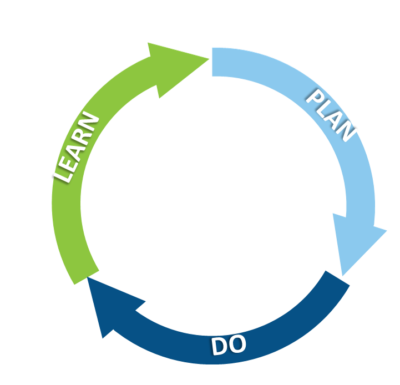Like any great skill, becoming a great Agile coach takes time and practice. It requires a continuous cycle of planning, doing, and learning.

High-Performing Teams
A high-performing Agile team sustainably surpasses expectations. They trust and respect each other, and collaborate to develop creative solutions that delight their customers. Self-organized teamwork is a key cornerstone of Agile. Most people want to create great things. Most people want to work with a great team. Often, despite a team’s best intentions, various components within the system they work in prevent them from fully actualizing their potential.
How Can a Great Agile Coach Help?
An effective coach empowers teams to leverage Agile concepts and practices to build solutions cheaper, faster, and better. A great Agile coach can significantly improve a team’s performance. They work for the team as servant-leader to remove delays and maximize value. Agile coaches work to build a better system within and surrounding the team that improves customer and employee satisfaction.
Agile coaching is human-centric. People aren’t robots. Agile is simple on paper, but can be very complex in practice because people are complex. Individuals have their own needs and goals. Building a work culture that meets both employee objectives and organizational objectives is essential to creating robust, successful companies. It is also challenging to do and maintain.
A good Agile coach has a wide range of capabilities. They are teachers, mentors, enablers, and they model expert Agility. They can leverage each skill fluidly when in various situations and conversations. They know when to put the teacher or mentor hat on versus the coaching hat. Developing these skills takes knowledge and practice.
Coaching is hard. Some days can be disappointing when there is significant resistance. A great Agile Coach is all about putting people over process and they develop excellent soft skills to work effectively with all kinds of people.
Plan: Make a Plan to Improve Your Coaching Incrementally and Iteratively
Based on what you’ve learned, pick a single skill or coaching practice you want to improve. Then, create a simple time-boxed roadmap to figure out how you will go about practicing and evaluating yourself. For example, If you want to become better at training Agile, put together a lesson on an Agile concept and plan a time and day to teach that lesson.
Do: Put Your Planning Into Practice
We learn, remember, and grow most by doing. Take that skill you want to develop and practice with your teams. If you want to improve your retrospectives, practice high-level facilitation. Did the team have a more interactive, solution-oriented retrospective? Evaluate and learn from the feedback and continue the cycle of learning, planning, and doing.
Learn: Learn from Others. Learn from Your Mistakes. Learn About Yourself.
When I first worked on a Scrum team I also served as the Scrum Master. I had zero training and no mentors. Unsurprisingly, I wasn’t a great Scrum Master.
Among other challenges, I was unsure how to successfully:
- Handle conflict within the team
- Gather and provide meaningful metrics to management without sacrificing agility
- Assist team members who didn’t want to change their existing process to support agility
- Enable team members to make intelligent decisions when I didn’t know the answers
- Coach product owners, managers, and stakeholders in Agile
Most senior coaches I know spend years developing their coaching skills through trial and error. As an Agile coach, I was lucky to have great mentors who assisted me early on to deal with the challenges I had effectively.
I took ICAgile’s Agile Team Facilitation and Agile Coaching courses three years ago in Atlanta. Although I’d been coaching Agile for five years, I learned so much that significantly improved my coaching. I kept asking myself during the class, “Why didn’t I take this course earlier in my career!?” I learned better ways to handle conflict, conduct a coaching session, and having difficult conversations that led to positive outcomes.
I am unabashedly passionate about providing this class for NextUp Solutions. From the inception, I wanted to make it very practical for new coaches and experienced coaches alike; not just rehash theory. It is a hands-on, workshop based on the reality coaches will face every day. Participants will seriously upskill their coaching through numerous plan, do, learn cycles on effective coaching, mentoring, and teaching.